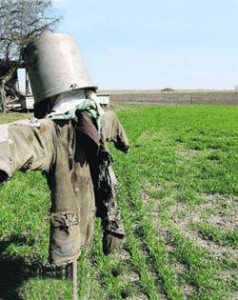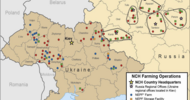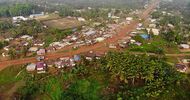
The Day (Kiev) | Tuesday 29 December 2009
This will not solve the land issue, experts say
By Vitalii KNIAZHANSKY, The Day
The events of last week can plough many furrows on the faces of Ukrainian peasants. On December 22 parliament adopted a surprisingly unanimous decision to extend the moratorium on the sale of agricultural lands until 2012. Most striking was the fact that almost no one in this group of arguably Ukraine’s largest landowners gathered in the domed building cast a negative vote: out of 432 MPs present, 344 supported the extension, while the others were either absent or did not vote. In a different situation one could say the law was passed with, so to say, without a hitch, but in this case the conclusion is this: the parliamentary session was run by hypocrites.
Indeed, no one doubts that the politicians voted for the prolongation of the moratorium for purely political reasons, as if disabling for some time the part of the brain that is responsible for the economy. In particular, MP Anatolii Kinakh cast an affirmative vote; in the spring of 2007, as the minister of economy in Viktor Yanukovych’s government, he said that both the government and parliament were interested in the prompt launching of the land market and stated that an operating market would prevent corruption in land purchase transactions.
“Only distinct and transparent conditions will lower the level of abuse in this sphere,” insisted Kinakh. He further believes that the absence of a full-fledged land market decreases the competitiveness of the domestic economy and puts obstacles in the way of foreign investments. The minister hoped that the land would become a commodity already on Jan. 1, 2008. As is known, this was not to happen.
Let us listen to the arguments of those who changed their attitude to the possibility of land sale. The president of the Ukrainian Agricultural Confederation Leonid Kozachenko said in his conversation with The Day: “Our original position lied in the fact that we supported the land market. But at the beginning of this year we saw that everything was done to prevent this market from being established and meanwhile, an extremely favorable foundation for corruption was created. And then for the first time we called for a moratorium.
“There is no database on current landowners and hence no information on how the immense areas of reserve lands are being allotted. It is unknown today who has the seal and the right to sign documents determining ownership. Worse still, there is no legislation to transparently and clearly monitor the land market when it appears.
“All of this gave us reasons to support the idea of extending the moratorium. At present the situation (compared to spring) has escalated. The state governmental bodies responsible for the realization of the land reform are acknowledged as most corrupt in the country. It would be wrong to give them the right to regulate the land market. That is why we are not against the prolongation of the moratorium. If the government is replaced, real efforts to fight corruption are made, and there are results (they can be expected no sooner than in a year after the coming of the new government), then in 2011 we will be able to see the first signs indicating that there are reasons to cancel the moratorium and establish the transparent and efficient land market”.
Meanwhile, state land ownership certificates are being issued in the country at an enhanced rate with considerable costs allocated from the state budget. The prime minister even believes that this process is being purposely slowed down by authorities, and because of this dismissed 400 employees of the State Service of Geodesy, Cartography, and Cadastre.
Let us assume that registering land ownership rights will somehow facilitate using it more efficiently by peasants. But can this hypothetical effect be compared with the one that could be expected after the cancellation of the ban on the free sale of land? One reader of The Day wrote: “The quiet misappropriation would be replaced by the open market; investors would come to the countryside and would create jobs for currently unemployed workers”. It is difficult to disagree with this. However, both the government and parliament, both those who wield power and those who are in opposition likely believe that not all lands have been divided on the criminal shadow market in this country. In two years they will finish dividing it, and only then will they give an opportunity for a real investor.
Anton Filipenko, president of the Ukrainian Association of International Economists, emphasized in his conversation with The Day: “The moratorium is a reactionary decision that perpetuates the negative situation in Ukraine. The entire world uses land as commodity, so any delay in the process of involving land in the sphere of market relations is a loss for our economy and hence for people. Another thing is that mechanisms should be found to defend the country from latifundism.”
For the time being, contrary to the Constitution, the land owner does not have the right to freely use it, says Vadym Hryb, head of the supervisory board of the TEKT group. He adds that as a result of the prolongation the land again failed to become a commodity, which threatens the country with stagnation at best. He is confident that the investment climate will suffer above all, affecting all people who work the land. Again, the Verkhovna Rada gave 344 votes for this. Now the ball in the president’s court – he has always considered land to be a commodity.
Oleksandr RIABCHENKO, economist:
“The unanimity in the land issue demonstrated by the politicians is an expression of pre-election unity. However, by postponing the solution of this problem until later all the governments and parliamentarians make a fundamental economic mistake: one can build an economy that doesn’t correspond to economic principles, but it will never be successful. In my opinion, there should be a limitation for amount of land that can be purchased, not sold. It’s time to stop limiting the seller in his right to sell. The task of the state is to make sure this does not lead to the emergence of large latifundists.”
Andrii MARTYN, Ph.D. in economics, associate professor at the Department of Land Management, National University of Life and Environmental Sciences of Ukraine:
“In fact, the moratorium wasn’t extended; it remains the same. The newly established date doesn’t change the situation. Until the laws on the state cadastre and the land market are adopted, nothing will change. But the Verkhovna Rada has acted in its old fashion. They must believe that their obligation is to extend the moratorium before the New Year. Though again, it could have been ignored. This is the lack of understanding of the real situation on the market. If it is necessary, the land is sold and bought. However, because of the moratorium this process doesn’t have any advantages for agriculture or the protection of peasants.
“The moratorium today is just a ban for the owners to use their property. There are no constructive ideas. The reasons cited on the website of the Verkhovna Rada do not hold water. Due to the moratorium, the competitiveness of Ukrainian agriculture decreases considerably. Since there are no credit resources and no land as the main means of production (for now it is regarded as temporary capital), there are no major investments. The landholder will never invest in the development of agricultural infrastructure – only the owner can build numerous roads, grain elevators, farms, etc. Thus, today the moratorium arrests the normal development of agriculture.
“This moratorium leads to a further decrease in the capitalization of Ukrainian lands. They are still non-liquid assets. The transfer of the property right to efficient owners is not there, and leasing relations have many drawbacks. The communists have this slogan: ‘Land must belong to those who work it!’ So today the land in Ukraine does not belong to those who work it. Everyone got used to the moratorium. And no one attempts to analyze what advantages agriculture would get if it were cancelled.”
Andrii KOSHYL, president of the Land Union of Ukraine:
“Cancelling the moratorium is possible only if parliament adopts the law ‘On the Land Market’ and ‘On the State Land Cadastre’ (this condition is in the transitional provisions of the Land Code of Ukraine). MPs know about it very well. In my opinion, another extension of the moratorium is rather a political decision, because any political power that will dare to openly support the cancellation of the moratorium risks losing votes.”
Yaroslav ZHALILO, president of the Center for Anti-Crisis Research:
“In my opinion, the prolongation of the moratorium is a demonstration of the unformed environment that would allow for normal land market to work. Everyone understands very well that its cancelation will lead to considerable disorganization of land ownership. Now we observe disorder in the sphere of business property (hostile takeovers and the inactivity of courts). If this practice spreads to the land market, all present successes of the agricultural sector can vanish very quickly.”
Oleksandr KOVALIV, deputy director of the Department of Rural Territories Development of the Ministry of Agricultural Policy of Ukraine:
“They (MPs – Editor) don’t care: whether it’s a moratorium for many years or [open] market, because they, in fact, own most of the lands. They are also OK with long-term lease – until poor peasants die. The same continues for 15 years, and, in my opinion, such an unsystematic course of reforms hurts everyone. This is despite the fact that the agricultural complex has long been in need of organization: today agricultural holdings possess 20,000 – 100,000 hectares of land. Is this normal? There are appeals that land must belong to those who work it. But do peasants now have access to credit resources, etc.? All these policies should be revised in a comprehensive way.”
Pavlo KALENYCH, director of the agricultural firm Olhopil:
“My personal opinion, and I’m sure this is the opinion of the majority of agricultural production manufacturers, is as follows: land mustn’t be sold today. This is abnormal, because ordinary Ukrainians can’t buy it. The “big” business will again abuse the situation. That is why I’m absolutely against the sale of land. I just don’t understand our president who says that all the troubles in agriculture lie in the ban for land sale. And cancelling the moratorium is the only thing that needs to be done. I support the moratorium for land sale. Reforms, of course, are necessary but not of this kind. I live and work in a village, and I am horrified to watch the village die. And the state is looking the other way.”
Andrii NESTERUK, senior analyst, investment company Phoenix Capital:
“The prolongation of the moratorium for the sale of agricultural lands until 2012 is neutral for the sector, because this action had been expected. In addition to the political implication of the decision and the absence of the needed legislation, the extension of the moratorium has economic meaning as well. In the conditions when a hectare of land is leased for USD 30–40 per year, the land will hardly be bought for more than USD 200—400 per hectare. It is not difficult to calculate that a peasant will get for his share about USD 2,000, i.e., he will essentially give it away. That is why the land market should be introduced after the end of the crisis to find a reasonable balance between the interests of landowners and those of agricultural companies.”












